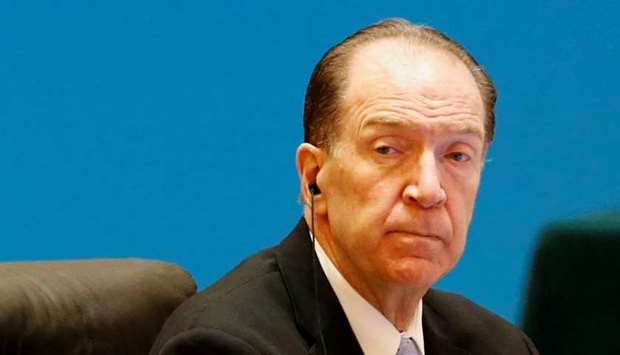World Bank President David Malpass expects private creditors to work out a methodology to join the Group of 20 in providing debt relief for the world’s poorest economies to help them fight the global pandemic.
The G20 in April agreed to allow a temporary suspension of debt repayment for more than 70 impoverished nations. Some private lenders have been reluctant to do the same, citing concerns over rating downgrades and fiduciary obligations. The Institute of International Finance estimates that the world’s poorest nations have some $140bn in general government debt-service obligations due through the end of the year.
“The view of the international community was very clear in the G20 communique and discussions, that the private-sector creditors are expected to work out a methodology to provide comparable treatment to what’s being done by the official bilateral creditors,” Malpass said in a phone interview on Monday. “I think they will be able to do that and need to push forward.”
The World Bank on Friday released estimates showing that the borrowing nations stand to save $12bn through the temporary suspension of debt payments to government creditors.
Those are resources that the bank and the International Monetary Fund say could be better used to help deal with the public health emergency and economic crisis rather than prioritising payments to rich nations.
Angola, dealing with a plunge in oil prices and the virus impact, is set to be the biggest beneficiary of the plan. The southern African nation could see $3.4bn of potential savings, or about 28% of the total globally, according to World Bank estimates. China agreed to grant the nation a three-year moratorium on interest payments and instalments on its $21.7bn debt, Luanda-based Expansao newspaper reported on Monday.
China is owed almost 60% of the money that the world’s poorest nations would be due to repay this year, according to World Bank data. President Xi Jinping last week pledged to waive some African nations’ debt and said China is willing to provide further support including loan-maturity extensions to free up funds.
“I’m encouraged by the degree of commitment by China,” Malpass said. The move “has benefits for China over the long term in that it will have relationships with countries that are improved after the Covid pandemic,” he added.
Malpass rejected the call by some, including charity group Oxfam and lawmakers from two dozen countries led by Vermont Senator Bernie Sanders, that the World Bank itself provide debt relief. Malpass said that could hurt the institution’s credit rating and impair its ability to lend because the World Bank depends on current borrowers to repay their loans so it can make new ones.
“It runs the substantial risk of reducing the net positive flows that are available to the poorest countries,” he said. “It was explored thoroughly, it doesn’t make sense.
It’s a diversion from the core effort going on right now to find strong new programs to be able to transfer resources to the poorest countries during the crisis.”

u201cThe view of the international community was very clear in the G20 communique and discussions, that the private-sector creditors are expected to work out a methodology to provide comparable treatment to what’s being done by the official bilateral creditors,u201d Malpass said in a phone interview.
